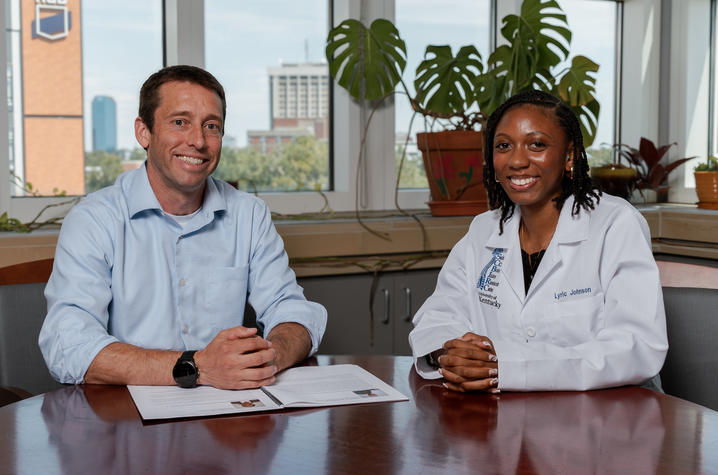‘Research Made Possible’: John Gensel and Lyric Johnson on neurotrauma research
Podcast produced by UK Research Communications. To view captions, push play and click on the CC icon in the bottom right-hand corner of the screen. If using a mobile device, click on the gear icon in the same area.
LEXINGTON, Ky. (Sept. 22, 2025) — Breakthroughs in neuroscience are happening at the University of Kentucky’s Spinal Cord and Brain Injury Research Center (SCoBIRC), where researchers are working to turn discovery into new therapies for people living with spinal cord and brain injuries.
This work also extends to training the next generation of scientists, giving undergraduate students experience in cutting-edge neurotrauma research.
SCoBIRC launched the All Access Research Training Scholars (AARTS) program in 2021 to provide students with funded research training in neurotrauma. Designed to remove obstacles to entering neuroscience, the program enhances that pathway, improves access to training and offers a $6,000 summer stipend.
In this “Research Made Possible” podcast, John Gensel, Ph.D., discusses the AARTS program. Gensel is the Spinal Cord and Brain Injury chair, director of SCoBIRC and a professor of physiology in the UK College of Medicine. He is joined by UK senior Lyric Johnson who recently completed the AARTS program.
“The goal is to provide research opportunities for people who otherwise may have been overlooked for research activities or may not quite have the strongest GPA,” said Gensel. “We try to provide a research opportunity for individuals who otherwise may not have received it.”
“I wanted to spend my last undergraduate summer doing something I never thought of doing,” said Johnson. “My friends in the neuroscience club encouraged me to try AARTS, even though I plan to go into dentistry. After meeting with Dr. Gensel, I felt reassured that I have a place in research.”
“This program is for people to be exposed to research to help shape their careers,” said Gensel. “Ultimately, the goal for anyone that comes to the center is to leave in a better place, professionally, hopefully beyond that, too, than when they came in. There’s also opportunity for people to accelerate their trajectory.”
Johnson expressed her hope that her experience would inspire others who may not feel they have a place in research to get involved. She encouraged students from all backgrounds to take advantage of opportunities like AARTS to discover their potential and gain confidence in a research setting.
“I was surrounded by people with different career goals than I have, but we all want to help others and use our skills to develop treatments or any solution in the health care world,” said Johnson.

As the state’s flagship, land-grant institution, the University of Kentucky exists to advance the Commonwealth. We do that by preparing the next generation of leaders — placing students at the heart of everything we do — and transforming the lives of Kentuckians through education, research and creative work, service and health care. We pride ourselves on being a catalyst for breakthroughs and a force for healing, a place where ingenuity unfolds. It's all made possible by our people — visionaries, disruptors and pioneers — who make up 200 academic programs, a $476.5 million research and development enterprise and a world-class medical center, all on one campus.




